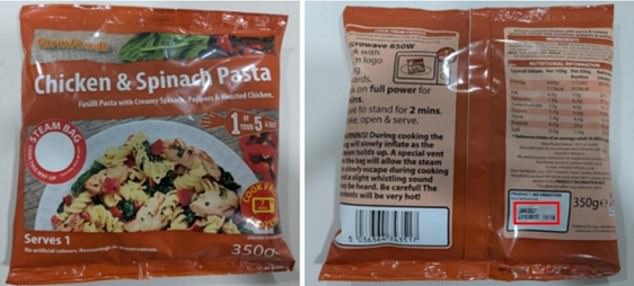A national supermarket is urgently recalling one of its popular pasta ready meals after it emerged that some packs had been mislabelled and contain undeclared allergens.
The Farmfoods Chicken and Spinach Pasta has been pulled from shelves because ‘some packs may contain crustaceans, fish and molluscs which is not mentioned on the label’.
According to the Food Standards Agency (FSA), this means the pasta is a ‘possible health risk for anyone with an allergy to crustaceans, fish and molluscs’—which can cause potentially fatal allergic reactions.
The recall applies to 350g pasta meals, with a best before date of January 2027 and the following batch codes: L5192B05D L5192C05D L5193C05D L5193A05D L5193B05D.
Crustacean allergies can be life-threatening. Even tiny amounts can trigger symptoms such as hives, swelling, vomiting and in severe cases anaphylaxis.
Customers who have purchased the item from one of the budget supermarket’s 341 stores are advised to not eat the product.
The notice reads: ‘If you have bought the above product and have an allergy to crustaceans, fish or molluscs do not eat it. Instead return it to the store from where it was bought for a full refund.’
Alongside the recall, Farmfoods has been advised to contact the relevant allergy support organisations, which will tell their members about the incident.

The pasta has been pulled from shelves ‘due to the possible presence of seafood’

The affected product is the Farmfoods Chicken and Spinach Pasta, with a best before date of January 2027
‘The company has also issued a point-of-sale notice to its customers,’ the FSA reports.
These notices explain to customers why the product has been recalled and advise them what to do if they have already purchased the product.’
For more information, consumers are being advised to contact customer services on 0121 700 7160.
In the UK, shellfish allergies are estimated to affect up to 1.5million adults, posing a serious health risk.
Sufferers can often tolerate specific types of shellfish, such as molluscs, including oysters and mussels, while being allergic to crustaceans such as prawns, lobster and crab.
In this instance, the product has been recalled because it could be contaminated with all three of these major food allergens.
Just trace amounts can trigger symptoms ranging from itchy skin to anaphylaxis—a life-threatening reaction that can cause the throat to swell and breathing to stop.
The most effective treatment is a timely injection of adrenaline, with sufferers of severe allergies encouraged to carry an auto-injector, such as an EpiPen with them at all times.

In 2016, 15-year-old Natasha Ednan-Laperouse collapsed and died after eating a baguette from Pret a Manger that contained sesame seeds not listed on the label.
The recall comes after the company issued another urgent recall of its Ultimate Keralan Chicken Curry, after it emerged that some batches had been mispacked, and were mistakenly produced with prawns.
This is just the latest in a spate of food recalls, following a series of high-profile tragedies linked to undeclared allergens on packaging.
On 17 July 2016, 15-year-old Natasha Ednan-Laperouse died after eating a Pret a Manger baguette containing undeclared sesame seeds.
Her death triggered the introduction of a new food and safety law in 2021, known as Natasha’s law, which necessitates full ingredient and allergen labelling on all food made on premises and pre-packed for direct sale.
The Anaphylaxis UK charity advises that anyone experiencing swelling of the lips or tongue, difficulty breathing, dizziness or collapse after consuming a product should use an adrenaline auto-injector immediately if prescribed, and call 999.
Farmfoods have apologised for any inconvenience caused but have not disclosed how the contamination occurred.
The FSA added: ‘Sometimes foods have to be withdrawn or recalled if there is a risk to consumers because the allergy labelling is missing or incorrect or if there is any other food allergy risk.
‘When there is a food allergy risk, the FSA will issue an Allergy Alert.’
Shoppers can stay informed about recalls by subscribing to the FSA’s allergy alert email service or checking the alerts section of its website.
